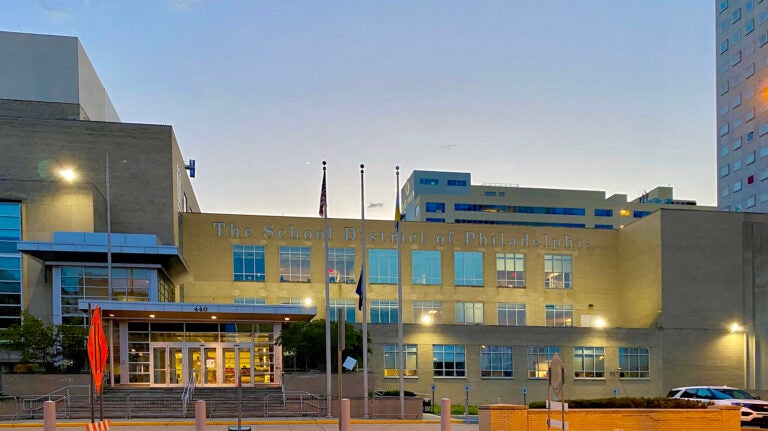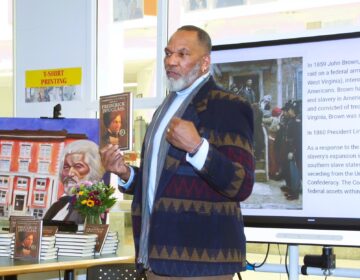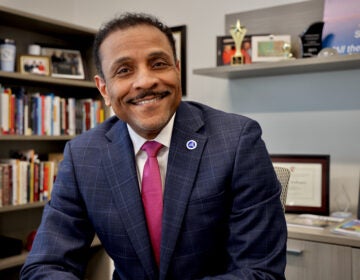Philly school district approves plan to start year online
The city’s Board of Education approved a revised version of the district’s reopening plan, the highlight of which was a commitment to all-virtual learning through November 17.

School District of Philadelphia headquarters (Danya Henninger/Billy Penn)
It’s official: The School District of Philadelphia and its 125,000 students will begin the school year online.
The city’s Board of Education approved a revised version of the district’s reopening plan, the highlight of which was a commitment to all-virtual learning through November 17.
The decision comes one week after a marathon board meeting that forced the School District of Philadelphia to abandon its original “hybrid” plan. District leaders hoped to have students in class two days a week — with an option for all-virtual education — but heard fierce opposition from parents and educators.
On Thursday, the school board passed a new health and safety plan by a vote of 7-1. Maria McColgan was the lone dissenter, although other board members noted that they voted “yes” begrudgingly.
Philadelphia joins Los Angeles, San Diego, Miami, and Houston among major cities that will begin the school year online.
The school district still hopes to hold some form of in-person school in the upcoming academic year, but that’s contingent on the state of the virus and buy-in from community members.
Superintendent William Hite said the district will reevaluate at the end of the first marking period. If the district does begin to phase in face-to-face instruction, he said, it will begin with younger children and students who have complex special needs.
The district went online for the last month-and-a-half of the prior school year after buying and distributing tens of thousands of laptops. Hite said the district will be better prepared for virtual education this time.
“We were ill-equipped to do this in the spring,” Hite said. “We’re taking a completely different tack this time.”
Student’s virtual days, Hite said, will include a blend of live, digital teaching from classroom teachers, small group instruction over video, and independent study. The district will also ask teachers to begin each day with a morning check-in to set expectations.
The school year will start one week later than originally scheduled — on September 2 — so educators can receive more training on virtual teaching.
The district is also working with city officials, Hite said, to open up “drop-off centers” where students can access Wi-Fi and complete virtual work while under adult supervision.
The need for those drop-off centers is a concern for many critics of the all-virtual option.
Those critics say an online-only plan — with no option for in-person learning — will harm the children of essential workers and low-income students who rely heavily on the support structures schools provide.
“This all-virtual school will not help children. Some are going to be home all alone — not in class, but on the streets,” asked Nicole Hunt, president of the union that represents the district’s school climate staff and food service workers.
Hunt and others also accused the district of bending to the will of a vocal minority, while ignoring the plight of working families who can’t attend lengthy school board meetings.
“The majority of parents was not on that call because they don’t think their voices matter,” she said.
But the union representing educators and the union representing school administrators opposed in-person school — as did dozens of parents who spoke passionately about the risks of learning in old school buildings while a deadly virus circulates.
“We are glad the School District of Philadelphia heard the concerns of administrators, students parents, and teachers,” said Elana Evans, an educator from Paul Robeson High School. “We have to follow science, not politics. Until all of us are safe, we are all in danger.”
Though the Board of Education vote to approve the all-virtual start was not close, several members noted their displeasure while voting yes.
Board President Joyce Wilkerson said she was “dismayed to see fear drive the decision” to abandon the original hybrid plan.
“It was distressing to hear people reject the science,” Wilkerson said, noting that the City’s Department of Health endorsed the district’s plan.
Wilkerson and other board members, however, said it became clear the hybrid model would not win the support of teachers and administrators — two groups critical to making it work on the ground.
“Implementation of that plan was never going to be successful,” she said.
Board member Angela McIver, the most strident critic of in-person learning on the board, hit back at other members who described the community backlash as anti-science or “hysteria.”
“That’s not right — to speak to people who spoke so passionately last week, [to say] we’re being hysterical,” McIver said.
The only board member to vote against the all-virtual plan was Maria McColgan, who is also the only medical doctor on the school board.
In a lengthy dissent, McColgan said the harm caused by the extended closure of school buildings will scar a generation of Philadelphia children — especially the poorest and most vulnerable among them.
“The way we’re trying to prevent this is causing more harm than the disease,” she said.

Get daily updates from WHYY News!
WHYY is your source for fact-based, in-depth journalism and information. As a nonprofit organization, we rely on financial support from readers like you. Please give today.



![CoronavirusPandemic_1024x512[1]](https://whyy.org/wp-content/uploads/2020/03/CoronavirusPandemic_1024x5121-300x150.jpg)


